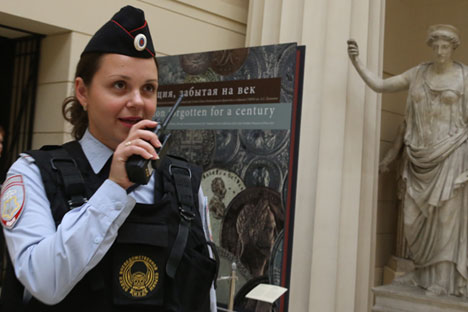
The departure of the policemen will greatly reduce the efficiency of the security system, say museum experts. Source: TASS
In the last month Moscow’s Manezh exhibition hall has witnessed two separate attacks on works of art being displayed there. On Aug. 14, a group of Orthodox Christian activists from the "Bozhya Volya" ("God’s Will”) movement attacked sculptures on show as part of the "Monuments We Don't See" exhibition, claiming that the works, which included depictions of Christ, insult the feelings of believers. The museum's security was unable to do anything and only called a police unit.
The incident, which resulted in damage to five artworks, met with outrage in Russian media and on social networks, and the government and the Orthodox Church issued statements roundly condemning the act. However, on Aug. 26, the TASS news agency reported a second attack on the exhibition in which a further artwork was damaged.
Yet incidents such as these may soon become more commonplace, as a state initiative is underway to withdraw policemen from Russian museums. On Aug. 21, 29 state museums, including the Hermitage, received a notice about the liquidation of stationary police posts in their buildings.
This only means that the physical guards will leave – the emergency button, as well as video security and other sources of security will remain. However, museum experts and officials at the Ministry of Culture believe that the departure of the policemen will greatly reduce the efficiency of the security system. The officials have already petitioned Russian President Vladimir Putin to reinstate the police posts.
Anatoly Yakunin, director of the Russian Interior Ministry's Chief Directorate on Moscow, said that the ministry is removing the posts due to large-scale cutbacks in the ministry.
"We have reduced almost 6,000 employees from the extra-departmental security staff, which is why we will also remove some stationary posts…. I can only say this financial, so to speak, burden will be removed from our directorate's budget," explained Yakunin.
He also said that this will happen no sooner than Jan. 1, 2016, when all the agreements between the museums and the police will officially end. However, the procedure will not affect everyone: The police guards will remain at "critically important sites," a list of which will be prepared by the Russian government.
More than half of state museums that have such posts have already received notice of the decision to abolish them, which will take effect from Nov. 1, according to a statement made by Mikhail Bryzgalov, Director of the Department of Cultural Heritage at the Culture Ministry.
Museums have an alternative, however: private security firms and the Okhrana commercial organization within the Interior Ministry, which is formed of retired employees.
Commenting on the initiative, Edward de Lumley, cultural attaché at the French Embassy in Russia, pointed out that in France not only private but also large state museums (the Louvre, Centre Pompidou, Musée d'Orsay, Versailles and others) hire guards from private firms and the police "never guards museums.” A similar situation exists in Switzerland and the UK.
But not a single Russian private security firm has the right to use firearms in emergency situations, say officials at the Ministry of Culture.
"If you have your own post for extra-departmental guards, the unit arrives in two to three minutes. If not, it will take 10 minutes, for example. Ten minutes is enough to destroy any work of art," said Zelfira Tregulova, general director of Moscow’s State Tretyakov Gallery.
The matter also concerns the security of millions of tourists, according to Alexei Levykin, director of the State Historical Museum, which is located in the center of Moscow, on Red Square.
"The center is very attractive for all types of provocations. An armed police post can stop a criminal and a terrorist," said Levykin.
The cost of hiring private security firms is also disadvantageous for museums. According to Mikhail Piotrovsky, director of the State Hermitage, the museum spends about 23 million rubles ($344,000) a year on security. If the police posts are removed, next year the Hermitage will have to spend approximately 100 million rubles ($1.4 million).
According to Zelfira Tregulova, as soon as the issue of replacing the police posts with private security guards arose, the Tretyakov Gallery received a letter from the Okhrana company, whose services are "at least one and a half times more expensive than the cost of extra-departmental guards," she said.
However, said Tregulova, it must be taken into account that the selection of private security firms is carried out in open tenders, which are usually not won by the most efficient company, but the cheapest.
Furthermore, since the tender is renewed annually, an unlimited number of people can potentially receive access to confidential information, such as the whereabouts of the museum and the kind of security system it has.
Another issue for museums is likely to be a possible rise in insurance costs stemming from the increased risk of theft and damage brought on by the decision to remove the police posts.
"If we see that the security of museum valuables has seriously changed, we will be forced to adopt adequate measures with respect to tariff policy," said Andrei Kucha, director of the Department of Cultural Valuables Insurance at insurance company AlfaStrakhovaniye. The Ministry of Culture also expects costs to go up.
However, according to Mirko Mudrinich, director of the Department of Exhibited and Valuable Goods at the Ingosstrakh insurance firm, it is still too early to speak about increasing costs. This will be influenced not only by security measures, but also incidents such as the Manezh scandal.
For now the insurance company is suggesting a policy of mandatory insurance of exhibits according to the "nail to nail" formula, that is, from the moment of the dismantlement of the exhibit to the moment of its return.
All rights reserved by Rossiyskaya Gazeta.
Subscribe
to our newsletter!
Get the week's best stories straight to your inbox